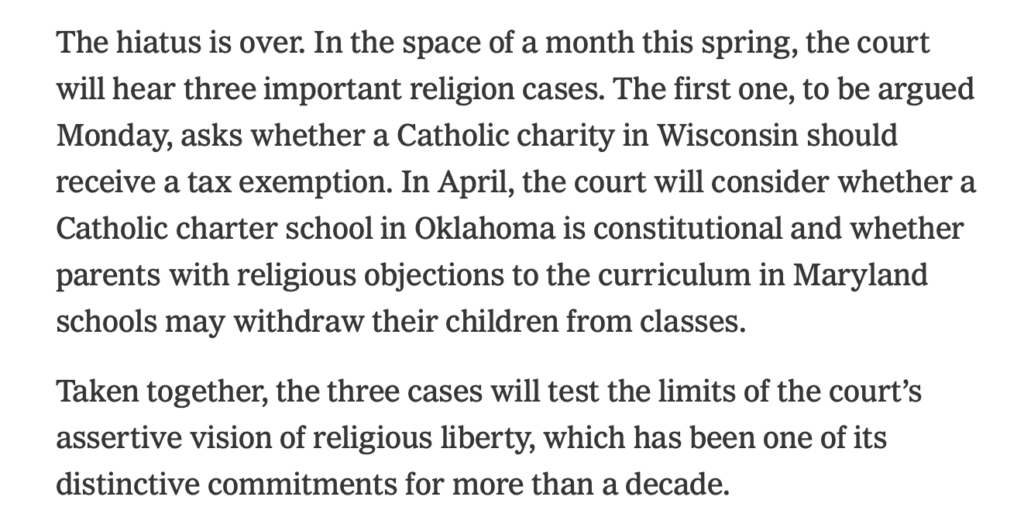For Education Week today, Rick Hess and I talked about the DOGE approach to governing – and what it means. Sample:
I’m at Harvard this evening, talking about the Department of Education and education research for an Askwith. Next week, I’ll be at ASU-GSV on the same topic with Jim Shelton, Erin Mote, and Sara Schapiro—that’s Monday at 11 a.m. local time. On Wednesday, the 9th, I’ll be at PPI for a PPI–BW event on Rick Kahlenberg’s new book—a fantastic, wide-ranging panel and what should be a great discussion. In May, I’ll be at SDP discussing the federal role in education research, May 8th, morning plenary with Derrell Bradford (50CAN), Sonja Santelises (Baltimore City Public Schools), Angela Minnici (WestEd), and Chris Minnich (NWEA/HMH). I’ll also be talking Medicaid and schools with Sarah Broome on May 12th. A few other public and private events coming—more soon.
ICYMI – new Wonkyfolk. If you like what we’re doing there please consider throwing Jed a subscription.
Rule of Threes
In briefings and conversations about the Trump Administration and the Department of Education, many are surprised to learn everyone in the administration doesn’t sing from the same hymnal. Let’s talk about that, because it matters.
Yes, Donald Trump is the president, and responsibility and accountability ultimately lies with him. But in practice, three power centers are shaping things on education, and it’s worth understanding the dynamic. Every administration includes factions and White House–agency tension is nothing new. It’s why there are processes to address, mitigate, and arrive at consensus policy positions.
Still, even beyond surprise characters like Big Balls, this setup includes some genuinely novel aspects. Here’s an overview of the factions:
The West Wing.
The White House’s domestic policy shop is dominated by Stephen Miller loyalists. Duke alumnus Miller—Trump loyalist, ideological speechwriter turned wonk—serves as Deputy White House Chief of Staff overseeing domestic policy and immigration. He also acts as a kind of minister without portfolio. This team generates most of the culture-war EOs and actions. Their beef with the Department of Education isn’t so much about policy details or operations as it is about a belief the agency is fundamentally a hub of “wokeism” that needs to be brought to heel, paradoxically with its powers used instead to fight wokeism in states and schools. White House–agency friction isn’t newsworthy in itself; the intensity here is.
What do they want? They want to mainline more of this and more of this all day, every day.
Bottom line: Find someone who looks at you the way they look at Chris Rufo.
DOGE.
The “Department of Government Efficiency”—basically Elon Musk’s government-cutting vision grafted (grifted?) onto an Obama-era initiative—is something new. Also new: Congress rolling over and yielding its prerogatives without a fight. Even at its peak, the Clinton–Gore reinventing government project still worked through agencies and respected Congressional authority. This isn’t the Hoover Commission or Truman Committee either in terms of process. The Bush-era Homeland Security overhaul was political, but it, too, followed a more normal process. DOGE is different. The resistance from agency heads (some successful, some not) is telling—as is frustration from both inside and outside government, including among people who favor cost-cutting (see my conversation with Rick, he’s one). There’s an expiration date on this approach—we just don’t know when. People in red and blue states are pretty pissed about things like this, the red states are just talking to the media less. Republicans on the Hill would be happy to see Elon shown the door. In the meantime, this crowd is also spoiling for legal fights over executive branch spending authority.
What do they want? They want more of this with the same intensity they crave a zyn fix.
Bottom line: Wrap your head around this: Early-twenties hackers and coders—fresh from their parent’s basements and griping about women on 4chan, subsisting on chips and energy drinks while sleeping in IKEA beds hastily thrown into OPM offices—are nonetheless making consequential policy decisions for the nation.
The U.S. Department of Education.
Yes, the agency overseeing most federal education programs comes third here. This is where what one plugged-in wonk calls the “ExcelinEd Republicans” are working. These are credible folks in the field, they want to make a difference and see an opportunity for a new approach. But, they’re playing a weak hand with few fans in the other camps.
Linda McMahon is a competent administrator, serious about her job. McMahon has the President’s ear. That already mattered, and will again. Yet she and others in Department leadership are first and foremost Trump loyalists, open to radically overhauling the agency and ready to implement Trump’s wishes. Yes, they have clashed with the West Wing and DOGE at times, but they’re not running any kind of rear guard action.
What do they want? Left to their own devices, they want more of this.
Bottom line: These are our sector’s country club Republicans, legit conservatives but not bomb throwers. Problem is, it’s unclear how long we’ll still have much of a country club.
Want Eduwonk.com in your inbox via Substack? Sign up for free here.
Could the alignment change? Of course. Trump is still a real estate developer at heart—transactional, situational, improvisational. A global crisis, recession, or political shift could change things. Congress might become vertebrate again as DOGE-driven cuts hit red states and an election nears. The ratings for the Elon show are declining. Everyone sees the same polls. For now, though, there’s less a “Trump Administration view” than three competing power centers, each doing its own thing and staffed by people who see their jobs, opportunities, and responsibilities quite differently.
From a lobbying or advocacy standpoint, the implications are obvious even if the chaos and poor information flow makes things confusing: figure out who’s for, against, or indifferent to your issue(s) and act accordingly.
For Democrats and those opposing Trump, the picture’s more complicated. The president doesn’t have deep commitments on education—he’s a populist. In his first term, he increased education spending, including on HBCUs, tried to fold charter school funding into other programs, and backed due process for college students. You know, he mostly acted like a Democrat.* This time? He’s slashing the Department, deporting college students without due process, and issuing Executive Orders to expand school choice.
What’s changed? Politics—and what Trump thinks his base wants, based on his instincts and political feedback loops. That’s the opening for Democrats. Populism is a fickle friend. If Democrats choose smart targets, Trump won’t want to absorb backlash from his own voters. Yes, we’re talking about Democrats—the same party that’s picked an astonishing number of bad targets in education over the past decade. Here’s a recent list. But nothing focuses the mind like a crisis. Meanwhile, Republican and overreach are practically synonyms. Bread-and-butter education issues—not culture wars—are the Democrats’ path, if they can find it and keep their activist wing in check long enough to rebuild public trust.
Courting Change
The Supreme Court has three upcoming First Amendment religion cases—two directly related to schools. In The Times, Adam Liptak sets the stage:

We’ve talked about the Montgomery County, Maryland, case a bit around here—an entirely predictable intersectional pile-up. Yes, it’s amusing that the people lecturing us on cultural competence lacked it themselves. Still, the issues at stake are not trivial.
We’ve also looked at the religious charter schools case and why it could prove consequential for public charter schools.
After these are settled (or not, the Oklahoma case could be 4-4) keep an eye out for First Amendment speech cases.
Want Eduwonk.com in your inbox via Substack? Sign up for free here.
*Yes, I know the due process policy a string of federal courts struck down before Trump overhauled it during his first term originally came from Obama-Biden. But you get the point—work with me here.
View the original article and our Inspiration here

